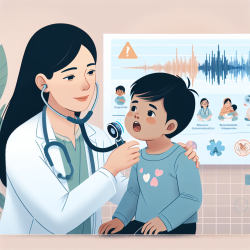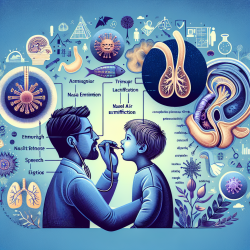Introduction
As practitioners dedicated to enhancing the lives of children, it is crucial to stay informed about the latest research findings that can guide our interventions. A recent study titled "Alterations in deglutition in children with congenital Zika virus syndrome" offers valuable insights into the swallowing difficulties faced by children with congenital Zika virus syndrome (CZS). By understanding these findings, we can better tailor our therapeutic approaches to improve outcomes for these children.
Understanding the Study
The study conducted a cross-sectional analysis comparing 45 children with CZS to 45 typically developing children. The primary focus was on evaluating swallowing through clinical feeding assessments and acoustic parameters using Doppler sonar. The results revealed significant differences in swallowing abilities between the two groups, with children with CZS exhibiting moderate to severe oropharyngeal dysphagia.
Key Findings
- Children with CZS showed insufficient lip closure (93.3%) and altered tongue and cheek tonus (77.8% and 75.6%, respectively).
- Significant difficulties were observed in sipping movements and lip/spoon contact during feeding.
- Clinical signs of laryngotracheal penetration/aspiration, such as coughing and labored breathing, were prevalent.
- No significant differences were found in acoustic parameters between the two groups, indicating the need for further research in this area.
Implications for Practice
These findings underscore the importance of comprehensive clinical evaluations in identifying swallowing impairments in children with CZS. Practitioners should focus on:
- Implementing targeted interventions to improve oral motor skills and swallowing function.
- Monitoring for signs of aspiration and adjusting feeding techniques accordingly.
- Collaborating with multidisciplinary teams to ensure holistic care for affected children.
Encouraging Further Research
While the study provides valuable insights, it also highlights the need for further research into the acoustic parameters of swallowing in children with neurological disorders. Practitioners are encouraged to engage in or support research initiatives that explore innovative assessment tools and interventions to enhance our understanding and treatment of dysphagia in this population.
Conclusion
The study "Alterations in deglutition in children with congenital Zika virus syndrome" offers critical insights into the swallowing challenges faced by children with CZS. By integrating these findings into practice and supporting further research, we can contribute to improved outcomes and quality of life for these children.
To read the original research paper, please follow this link: Alterations in deglutition in children with congenital Zika virus syndrome.










